Unit6SectionA1
人教版初中英语七年级上册Unit 6 Section A (1a-2d)-课件

A: Do you like salad? B: No, I don’t.
A: Do you like oranges? B: Yes, I.
2b Listen again. Fill in the blanks.
2c (Imagine you are having lunch with your friend.) Practice the conversations in 2b. Give answers
that are true for you.
2d Answer the questions below and then role-play the conversation.
Do you like bananas? 1 Yes, I do.
3
Do you like oranges? Yes, I do.
Practice
1c Practice the conversations above with your
partner. Then make you own conversations.
A: I like _h_a_m__b_u_r_g_e_rs__. Do you like _h_a_m_b_u_r_g_e_r_s____? B: Yes, I do. A: Do you like_t_o_m_a_t_o_e_s ? B: No, I don’t like___to_m__a_t_o_e_s___. A: Let’s have _ic_e_-_cr_e_a_m_. B: Oh, no. A: No? B: I don’t like _ic_e_-_cr_e_a_m___.
Unit_6_Section_A-1
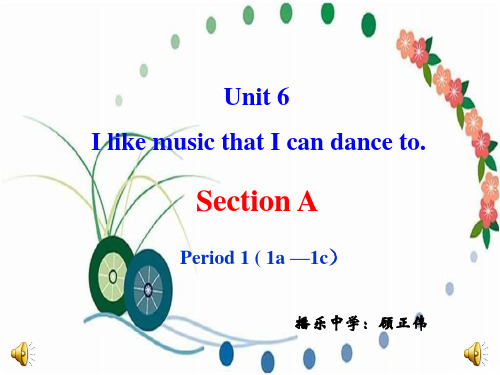
Revision
What’s your favorite music?
I like pop best.
更多资源
Revision
What’s your favorite music?
I like jazz best.
Revision
What’s your favorite music?
关系代词who / that的作用: a. 做代词,代替先行词 b. 在从句中担任句子成分:主语或宾语 c. 做连词,把主句和从句连接起来
I have an apple.
An apple is red.
I have an apple that is red.
修饰先行词 an apple
I like some friends.
Some friends like sports.
I like some friends who like sports.
修饰先行词 friends
I like music.
I can dance to the music.
I like music that I can dance to.
修饰先行词 music
I prefer music that has great lyrics.
classical music
I like music that is quiet and gentle.
light music
I like music that isn’t too loud.
I t can remind me of the past years.
I like classical music best.
Revision
Unit6SectionA1a-1c课件人教版七年级英语上册
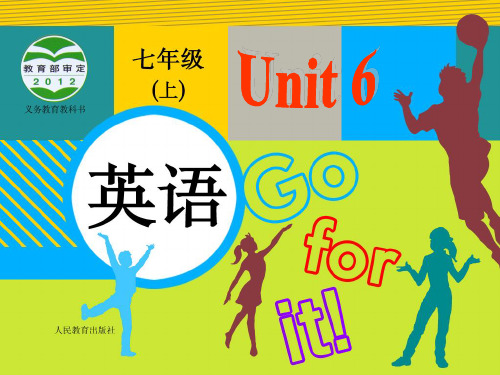
二、 根据图片提示完成句子。 1. — _D_o_ you like _st_r_a_w_b_e_r_r_i_e_s
— Yes, I do. I like _b_a_n_a_n_a_s_, too. 2. — _D_o_e_s_ your father like _p_e_a_r_s_
Do you like .... B: Yes, ..... \ No, ..... I like .... A、B、C: OK, let's have ....
grapes
mangoes
一、 选词填空。
Do you like ___ (strawberry/strawbe√rries) 2. Here are some ___ (tomatos/toma√toes). 3. Let’s ___ (h√ave / has) apples and bananas. 4. John likes ___ (m√ilk/milks) and bread. 5. Sam ____ (don’t /√doesn’t) like vegetable
9. milk e 10. bread a
1b Listen and number the
conversations [1-3].
2 A: Do you like salad
B: No, I don’t.
1 A: Do you like bananas
B: Yes, I do.
3 A: Do you like oranges
tomatoes oranges strawberries eggs
carrots
pears
hamburgers
eggs oranges apples bananas pears milk food ice-cream salad bread strawberries rice chicken carrots tomatoes
初中英语八年级下册教案unit6Section A 第1课时 (1a~2d)

句型1.Tonight,when the moon is shining bright,we’ll be able to see the stones.今晚,当月光明亮地照耀着大地时,我们就能看见这些石头了。
2.As soon as you wake up,you must go to the forest with your father.你们一醒就必须和你们的父亲去森林。
3.It’s leading us to that wonderful house made of bread,cake and candy.它正把我们带向一座由面包、蛋糕和糖果组成的漂亮房子里去。
语法连词unless, as soon as和so… that的用法知识目标掌握并能灵活运用本单元的重点词汇及相关短语,能够正确掌握并运用连词unless,as soon as和so…that的用法。
能力目标能够从时间,地点,人物及事件等方面描述英文故事。
情感目标通过一些经典故事,学会乐于助人,主动地去帮助处于困境中的人们;在生活中,当面对困难抉择时,要勇敢地面对一切,决不放弃。
【课时建议】本单元建议5课时Section A (1a~2d)………………………………………………………………………………………1课时Section A (3a~4c)……………………………………………………………………………………1课时Section B (1a~1d)……………………………………………………………………………………1课时Section B (2a~2e)……………………………………………………………………………………1课时Section B (3a~3b)……………………………………………………………………………………1课时词汇短语:主要采用图片及多媒体展示助记法。
基本句子:采用多媒体展示及交际法(利用多媒体展示两人进行交际时的情景)。
九年级新目标英语Unit6-When-was-it-invented-Section-A-1解读

2d Role-play the conversation.
Paul: Hey Roy, the subject for my school project is “Small inventions that changed the world.” Can you help me think of an invention?
► He takes no pleasure in his work.
► —Thanks for helping me.
—My pleasure. / It s a pleasure. 别客气。
pleasur 名词,“高兴;愉快”。常用短语 My
e
pleasure. / With pleasure. / It’s a
pleasure.
形容词,“高兴的”,短语 be
pleased
pleased to do sth.“乐于做某事”;be pleased with “对……满意”,句子的
主语通常为人
pleasan 形容词,“令人愉快的”,可作定 语
►It am pleas、ed表w语ith,t修he饰pa物inting.我对这幅画很满意。
The car was invented before the TV set.
A: I think … was invented before … B: Well, I think … was invented after ….
The telephone was invented before the TV set.
人教PEP七年级下册英语unit6Section A (1a~2d)教案与教学反思

第6单元I’m watching TV. 上信中学陈道锋类别课程标准要求掌握的内容话题Everyday activities日常活动Section A 单词newspaper n.报纸 use v.使用;运用 soup n.汤wash v.洗 movie n.电影 just adv.只是;恰好house n.房子 drink v.喝 n.饮料 tea n.茶;茶叶tomorrow adv.在明天 n.明天;未来短语read a newspaper 看报纸 talk on the phone通过电话交谈use the computer 使用电脑 make soup 做汤wash the dishes 洗餐具 go to the movies 看电影eat out出去吃饭 make dinner 做晚饭 drink tea 喝茶句型1.—What’s she doing? 她在做什么?—She’s washing her clothes.她在洗她的衣服。
2.—Are you doing your homework? 你在做你的家庭作业吗?—Yes, I am. /No, I’m not. I’m cleaning my room.是的,我在做。
/不,我没做。
我在打扫我的房间。
3.—Is he reading a newspaper?他在看报纸吗?—Yes, he is./No, he isn’t. He’s playing basketball.是的,他在看。
/不,他没有看。
他正在打篮球。
Section B单词pool n.游泳池;水池 shop v.购物 n.商店supermarket n.超市man n.男人;人 race n.竞赛study v. & n.学习;研究state n.州 the United States 美国;美利坚合众国any adj.任何的;任一的pron.任何;任一 child n.儿童(pl.children)other adj.另外的;其他的pron.另外的人(或物) wish v.希望oung adj.幼小的;年轻的 miss v.怀念;思念;错过delicious adj.可口的;美味的 still adv. 还;仍然American adj.美国的;美洲的 n.美国人;美洲人host n.主人;东道主 dragon n.龙短语live with sb.和某人一起住 Dragon Boat Festival 端午节make zongzi 包粽子 watch… on TV 在电视上看……the night befoe 前一天夜里 host family寄宿家庭read a story to sb.读故事给某人听 living room 客厅talk show脱口秀 study for为……考试而学习句型1.…, so it’s like any other night for Zhu Hui and his host family.……,所以对朱辉和他的寄家庭来说,今晚和任何一个平常的晚上是一样的。
人教版英语八年级上册 Unit 6 Section A 1a-1c 课件
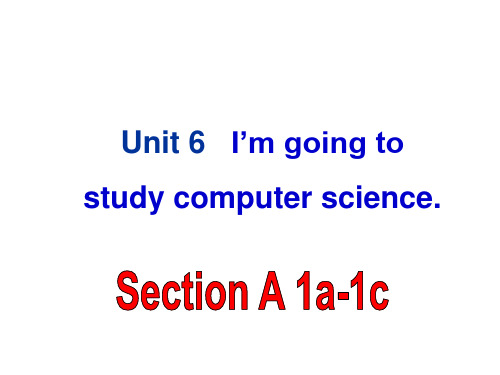
When 当…的时候
What do you want to be when you grow up?
grow up 长大
I want to be ……
A:What do you want to be when you grow up?
B:I want to be a/an……
be going to 打算
a cook /kʊk /
My father isn’t a cook. But he can cook delicious food.
a pilot
/'paɪlət /
a pianist
/'pɪənɪst /
The pianist plays the piano very well.
a violinist
actor take acting lessons
--What do you want to be when you grow up?
--I want to be an actor. --How are you going to do that?
--I’m going to take acting lessons.
engineer study math hard
--What do you want to be when you grow up?
--I want to be an engineer. -- How are you going to do that? -- I’m going to study math hard.
___computer programmer ___ cook ___ doctor ___ engineer ___ teacher ___ violinist ___ bus driver ___ pilot ___ pianist ___ basketball player ___ scientist ___ actor
人教版九年级英语第六单元Unit6 SectionA-1(1a-2c)

▪ in those days
在过去
▪ personal computers 个人电脑
Unit 6
When was it invented?
2a-----2c
electricity /ilektrisəti/ n. 电;电能
▪ In modern cities we can’t live happily without electricity.
six(1976).
再听一次,填单词。
▪ Alice: Was your life very difficult when you were a kid?
▪ Grandma: Oh, not really. Why?
▪ Alice: Well, you didn’t have modern
inventions like a telephone , right?
Talk about with your parterner.
A: I think the calculator was invented before the computer.
B: Well, I think the calculator was invented after the computer.
▪ Grandma: Of course we did! How old do you think I am? The telephone was invented in 1876. You need to take a history class, Alice!
▪ Alice: Haha! How about car ? They
weren’t invented yet, were they?
人教版八年级英语(上)Unit6SectionA1a-1d课件
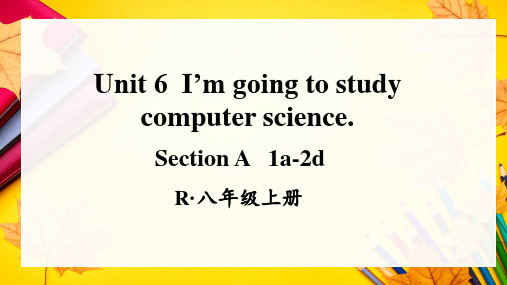
n.钢琴家 n.科学家 长大;成熟;成长 计算机程序设计员 确信;对……有把握 确保;查明
/'pɪənɪst/
pianist
/'saɪəntɪst/
scientist
grow up
/ 'prəʊgræmə(r)/
computer programmer
be sure about
make sure
what do you want to be?
a cook
[kuk]
a bus driver
['draɪvə(r)]
a pilot a basketball player
['paɪlət]
['pleɪə(r)]
a pianist a violinist a scientist ['pɪənɪst] [ˌvaɪə'lɪnɪst] ['saɪəntɪst]
--How is he going to do that?
-- H__e_i_s__g_o_i_n_g__t_o_t_a_k__e_a__c_ti_n_g___. lessons
I am going to study computer science.
--___W___h_a__t_d_o__e_s_h__e__w_a__n_t to be when he grows up? --__H__e_w_a_n_ts_t_o_b_e_a_c_o_m_p_u_t_er_p_r_o_g_ra_m_m__er_.__ -- __H_o_w_i_s_h_e_g_oi_n_g_to__do__th_a_t?____________ --__H_e_is_g_o_in_g_t_o_s_tu_d_y_c_om__p_ut_e_r _sc_ie_n_c_e._____
Unit6SectionA1a--1c课件人教版七年级英语上册

1a Match the words with the things in the picture.
ad e g i
h
c b
f j
1. hamburgers _d__
2. tomatoes _i__
3. oranges _f__ 4. ice-cream _h__ 5. salad _b__ 6. bananas _g__ 7. strawberries _c__ 8. pears _j__
or __p_e_a_rs___.
Different people like different food. How about your
family? Please write to me soon. Yours, Tony
Speak and write
Report(报告): Hello, everyone! As you know, different people like different food. In our group, I like...and...,but I don't like... ____likes…and…, but ___doesn’t like… ___likes …and … but ____ doesn’t like… ___likes …and … but ____ doesn’t like…
Unit 6 Do you like bananas?
SectionA(1a-1c)
Learning objectives
To learn to talk about likes and dislikes To learn new words about food: apple, banana, hamburger, tomato, potato, icecream, salad, strawberry, pear, milk, bread, food, sure, vegetable, fruit
Unit 6 Section A(1a-2d)八年级英语下册(人教版)

a clever monkey 72 changes
Journey to the West
西游记
a goddess [ˈɡɒdes] n. 女神 stones [stəʊn] n. 石头
repair
Nu Wa Repairs the Sky
女娲补天
_b__ Journey to the West
Let’s discuss.故事讨论
1. How does the story begin? 2. What happened next? 3. Where would they put all the earth
and stone from the mountains?
Once upon a time, there was... There were... so ... that...
Yu Gong told his family that they should all help him to 6. beginning _m_o_v_e_t_h_e_m_o_u_n_t_a_in_s___. He wanted to put all the earth and stone
from the mountains 7. i_n_to__th_e_s_e_a because it’s big enough to hold everything. So Yu Gong and his family all __s_ta_r_te_d_ digging the next
China is a great country with many traditional folk stories.
Chinese folk stories
中国民间故事
Unit6SectionA1a-1c说课稿人教版英语八年级上册

Unit6 I’m going to study puter scienceSection A (1a1c)Good morning, everyone ! I’m very glad to present my teaching design here.I’ll talk about it from the following parts.Part 1: The analysis of teaching material(教材分析)The topic is from Unit 6 I’m going to study puter science Section A (1a1c). It is a listening and speaking lesson,the first period of this unit. This lesson mainly talks about future intentions and how to achieve it.It is based on students lives .They can make students establishThe determination and confidence to strive for the life’s ideals. Part 2: The analysis of students(学情分析)The students have learned English for more than one and a half years so far. They have showed great interest in English. They want to express themselves but they are lack of vocabularies. Most of them don’t often use English to municate with others. Some of them are not active in the class because they are afraid of making mistakes. In order to encourage them to express themselves in front of oth ers, I’ll create some real situations for them to practice the key words and structures.Part 3:The teaching aims(教学目标)Knowledge objects(知识目标):1. Master the new words and phrases through some pictures:Cook doctor engineer driver pilot pianist scientist violinist grow up.2.Learn to use the target sentence patterns.What do you want to be when you grow up ? I want to be a/an...How are you going to do that? I’m going to do ../be going to+v to express future career plans and dreams.Ability objects(能力目标):1.To develop the students’ listening and speaking abilities.2.To train the students’ ability of working in pairs.3.Ask questions about Dream jobs using target languages.Moral objects(情感目标):By the end of the class ,students will set up life goals and find a way to achieve it.Part 4:Teaching important and difficult points(教学重难点):1.Master the new words and phrases.2.Be able to talk about future intentions.3.Train students to use the target language “ want to be a/an ” and “be going to ”to describe favorite jobs, and how to achieve it.Part5: Teaching methods(教学方法)In this lesson I’ll mainly use the Taskbased teaching method and the situational teaching method. That is to say, I’ll let the students learn in the real situations and finish tasks by listening and making dialogues. That can help students to get a better understanding of the key structures.Part6: Learning methods(学习方法)In this lesson, I’ll let them work in groups and pairs to practice the knowledge they have learned. In this way, they can learn better.Work in groups or pairs can also improve their ability of munica tion.Before we learn a new lesson, I always ask them to preview it. After they preview the new lesson, they can learn about the items and know the important and difficult points. And then, they willconcentr ate more on the knowledge that they don’t understand well. It can make them learn easily in class.Part 7: Teaching procedures(教学过程)In this lesson, I’ll finish it in three main parts and eight tips.Part 1 learning of new words and target language. (新知学习)Step 1. lead in (导入)In this step, Students play a guessing game and lead students to answer:what does she do?Step 2. Presentation(展示)Firstly,Students look at the pictures,videos,and listen,then the students just say some words to describe different kinds of jobs to learn new words of this lesson.Next, ask them to use a sentence to describe what do you want to be from these jobs.During the teaching, make students understand how to do next.And present the sentence How are you going to do that?Step 3. Practice(练习)I’ll invite some students to make dialogues, ask others to describe her favourite jobs .When they practice, I’ll tell them to pay more attention to theusage of “want to be” and “be going to”.Part 2. Listening and talking(听说活动)Step 4. listeningAfter they practice the target language, they have known how to describe jobs and mastered the words and structures. Next. I’ll let them do some listening practice.1.Prelistening. I’ll let the students finish 1a .2.Whilelistening.The first time, I’ll let them listen to the tape to fill in the blanks and then check answers.For 1b. The second time, listen again and tell me how is Tina/Larry going to do that.3.Postreading. Get students to read the dialogue together.Step 5. Pair work(合作)Let the students make conversations by using the information in1c. I’ll a sk the students to share their conversation in front of the class.Part 3 Moral education and summary(情感教育和总结)Step 6. Moral educationI’ll mak e a survey about futurejobs to let students report the survey,the students understand : work hard to realize your dream.Step 7. SummaryI’ll let students memorize what we have learned today with me together and show them on the screen.Encourage students to think about how to work hard to achieve their ideal career.Through this teaching activity, students will be able to think about their career dreams and realize their dreams can be realized through effort.Part 8: Homework(家庭作业)1.Remember the new words and target language .2.Talk about your dream job with your partners.3.Write a report about your dream job.Part 9: Blackboard Design(板书设计)Unit 6 I’m going to study puter scienceSection A (1a 1c)New words:cook doctor engineer driver pilotpianist scientist violinist grow upSentences structures:What do you want to be when you grow up ?I want to be a basketball player.How are you going to do that?I’m going to practice basketball every day. Part 10 :Teaching ReflectionIt’s never too late to learn。
人教版八年级英语下册Unit-6-Section-A-1公开课课件

Look at the pictures in 2a and tell the story in your own words. (2c)
__ The two mountains were very high and big.
__ A very old man tried to move the mountains.
__ A man told Yu Gong that he could never do it.
Listen again and fill in the blanks.
and stone from the mountains?
Make up your own conversations.
Example :
A: Do you know the story Yu Gong Moves a Mountain?
B: Certainly, I read it this week. A: How does the story begin? B: Well, once upon a time… A: What happened next? B: …
Chang E Flying to the Moon
Have you ever heard of these stories? Can you tell them to your partners?
Yu Gong Moves a Mountain
Now let’s enjoy the story below:
人教英语八年级上册Unit6Section A 1a-2c(共24张PPT)
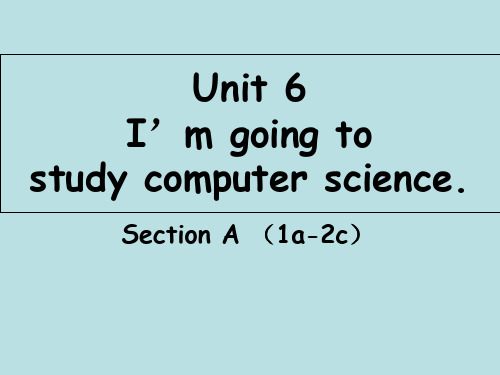
1b
Listen and fill in the blanks. Then match the items.
acting
computer basketball
math
Make conversations about the
1c jobs in 1a like this.
A: What do you want to be when you grow up?
violinist
pianist
I am going to do my homework tomorrow.
I am going to clean my room tomorrow.
I am going to wash my clothes tomorrow.
I He/She
am is
be going to do something
Girl: What do you want to be when you grow up, Cheng Han?
Cheng Han: I want to be a teacher. Girl: Are you going to move to Beijing? Cheng Han: No, I’m going to
and college first.
• 1. New words and phrases: computer programmer, cook, doctor, engineer, violinist, driver, pilot, pianist, scientist, grow up 2. be going to do 结构及其用法
move to Shanghai. Girl: And how are you going to
人教英语九年级全册Unit6 Section A 1a —1c
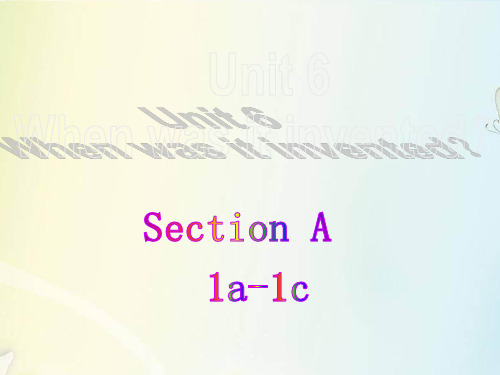
Look at the things below. In what
1a order do you think they were invented?
Discuss them with your group. Then number them [1-4].
B: I think it was invented in 1876.
A: What is the _______ used for?
B: It is used for __st_u_d_y_in_g__(_st_u.dy)
A: What is the _______ used for?
B: It is used for __c_ou_n_ti_n_g __(_co_u.nt)
Grandma: Yes, they were. Cars were invented in 1885. My family had a car.
Alice: Well, did you have a TV?
Grandma: No, we couldn’t afford one.
They were expensive in those days. The TV was invented around 1927, I think.
What are they used for?
light bulbs
They are used for giving light.
一、单项填空
(B )1. Many houses __________ by the earthquake and thousands of people were left
homeless.
